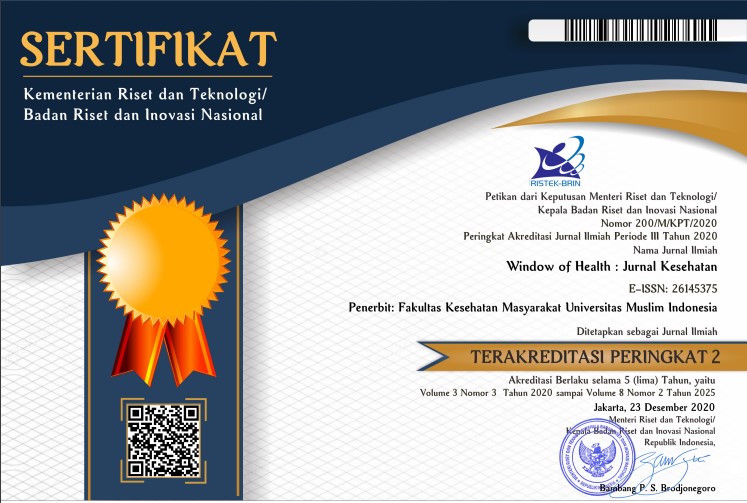E.Coli Bacterial Contamination and Sanitation Hygiene in Refill Drinking Water (AMIU) During the Covid-19 Pandemic
Abstract
Refill Drinking Water Depot (DAMIU) is one of the business activities that is increasing yearly, including in the Makassar City Layang Health Center Work Area. Affordable prices, which are more practical and easy to obtain, make many people consume them. This study aimed to determine the relationship between depot hygiene and sanitation implementation and the bacteriological content of drinking water in the work area of the Layang Health Center Makassar City. This research is descriptive and uses the cross-sectional approach. The sampling technique is total sampling, which takes the entire population to be sampled, so the sample in this study was 32 drinking water depots. Data was collected by observing, interviewing, and taking samples of drinking water examined at the Makassar City Health Service Laboratory. The results showed that there was a relationship between the treatment site and the bacteriological content of drinking water (p = 0.039 < = 0.05), and there was a relationship between the processing equipment and the bacteriological content of drinking water (p = 0.011 < = 0.05). There was no relationship between the handler and the bacteriological content of drinking water (p = 0.423 > = 0.05). It is suggested that the owner of the drinking water depot in the working area of the Layang Health Center pay attention to the condition of the place, equipment, and health of the handlers/managers of the drinking water depot.to produce quality drinking water that meets the requirements.
References
2. Syahril M, Nyorong M, Aini N. Pelaksanaan hygene dan sanitasi pada depot air minum isi ulang. Kesmas Prima Indones. 2020;2(1).
3. Mairizki F. Analisis Higiene Sanitasi Depot Air Minum Isi Ulang (Damiu) Di Sekitar Universitas Islam Riau. J Endur. 2017;2(3):389-396. doi:10.22216/jen.v2i3.2428
4. Ummah M, Adriyani R. Hygiene Sanitasi Depot Air Minum dan Kualitas Mikrobiologi Air Minum Di Wilayah Kerja Puskesmas Ngasem Kabupaten Kediri Jawa Timur. J Kesehat Lingkung. 2019;11(4):286-292. doi:10.20473/jkl.v11i4.2019.286-292
5. Selomo M, Natsir MF, Birawida AB, Nurhaedah S. Hygiene dan Sanitasi Depot Air Minum Isi Ulang Di Kecamatan Campalagian Kabupaten Polewali Mandar. J Nas Ilmu Kesehat. 2018;1:1-11.
6. Pant ND, Poudyal N, Bhattacharya SK. Bacteriological quality of bottled drinking water versus municipal tap water in Dharan municipality, Nepal. J Health Popul Nutr. 2016;35(1):17. doi:10.1186/s41043-016-0054-0
7. Puskesmas Layang. Profil Puskesmas Layang. (Puskesmas Layang, ed.). Makassar; 2020.
8. Baharuddin, A., Daud, A., Abdullah, T., Hatta, M. Sociodemographic the characteristics of “slum and urban area”customer behavior depot and identification of escherchia coli with RT-PCR by gen EF-Tu Indian Journal of Public Health Research and Development, 2018, 9(11), pp. 304–310
9. Birawida AB, Selomo M, Mallongi A. Potential hazards from hygiene, sanitation and bacterium of refill drinking water at Barrang Lompo island (water and food safety perspective). IOP Conf Ser Earth Environ Sci. 2018;157(1):1-7. doi:10.1088/1755-1315/157/1/012034
10. Suriadi, Husaini, Marlinae L. Hubungan Hygiene Sanitasi dengan Kualitas Bakteriologis Depot Air Minum (DAM) di Kabupaten Balangan. J Kesehat Lingkung Indones. 2016;1:28-35.
11. Baharuddin, A., Daud, A. Abdullah, T., Hatta, M. The findings of escherichia coli in drinking water with reverse transcriptase polymerase chain reaction method at 16s RNA gene, Indian Journal of Public Health Research and Development, 2018, 9(10), pp. 465–470
12. Tauna AI, Rambi E V, Jasman. Hubungan Hygiene Sanitasi Depot Terhadap Kualitas Bakteriologis Air Minum Isi Ulang di Kota Tomohon. 2015:1-10.
13. Baharuddin, A . Polymerase chain reaction (PCR) Method For Identification Gene Escherichia Coli And Officer Depot Behavior In Drinking Water Refill . Indian Journal of Public Health Research and Development, 2019, 10(1), pp. 315–320
14. Purnama SG. Diktat Inspeksi Sanitasi Lingkungan. (Program Studi Kesehatan Masyarakat, ed.). Bali: Universitas Udayana; 2017.
15. Permenkes RI. Peraturan Menteri Kesehatan Republik Indonesia Nomor
492/Menkes/Per/IV/2010 Tentang Persyaratan Kualitas Air Minum. Peratur Mentri Kesehat Republik Indonesia. 2010:MENKES.
16. Trisnaini I, Sunarsih E, Septiawati D. Analisis Faktor Risiko Kualitas Bakteriologis Air Minum Isi Ulang Di Kabupaten Ogan Ilir. J Ilmu Kesehat Masy. 2018;9(1):28-40. doi:10.26553/jikm.2018.9.1.28-40
17. Baharuddin A, Pelaksanaan Hygiene Sanitasi Depot Dan Pemeriksaan Bakteri Escherichia Coli Pada Air Minum Isi Ulang Di Kecamatan Mariso Kota Makassar Rosiding Seminar Nasional 2018 Sinergitas Multidisiplin Ilmu Pengetahuan Dan Teknologi, Vol. 1, 2018, ISSN: 2622-0520
18. Bahri ARS, Ikhtiar M, Baharuddin A, Abbas HH. Identification of Microplastic in Tilapia Fish (Oreochromis mossambicus) at Tallo River in Macassart. Int J Sci Healthc Res. 2020;5(3):406-
411. www.ijshr.com.
19. Baharuddin A, Ichsan M. Microbial risk assessment (MRA) as a method of assessment for drinking water refll in pattinggaloang district of Makassar city. Indian J Forensic Med Toxicol. 2020;14(2):1793-1798. doi:10.37506/ijfmt.v14i2.3197
20. Rahman, Hardi I, Baharuddin A. Identifikasi Bakteri Staphylococcus Sp Pada Handphone Dan Analisis Praktik Personal Hygiene. Wind Heal. 2018;1(1):40-49. http://jurnal.fkmumi.ac.id/index.php/woh/article/view/woh1108.
21. Baharuddin A, Author C. The Existence of Staphylococcus aureus at the Imported Clothing in Makassar City. Int J Sci Healthc Res. 2020;5(March):191. www.ijshr.com.








